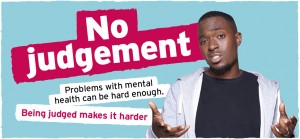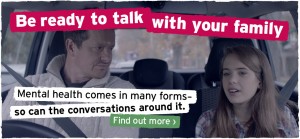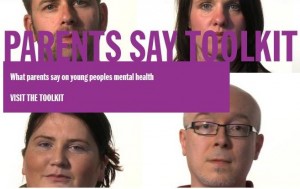At the end of the second Hunger Games novel, the heroine, Katniss escapes from the arena with her fellow victor, Fennick. Unsurprisingly, given their experiences, they both suffer mental breakdowns. I am struck by how the author, Suzanne Collins, deals with this episode, not seeking to disguise or hide the fact that her heroine is not coping and unable to function. It is time and the support of her younger sister Primose (‘Prim’) and friend, Gale - not just treatment - that help her to some form of recovery.
Over the next few years, there will be significant additional investment in child and young people’s mental health provision. However, service improvements are not going to benefit young people if they are too afraid to seek help and support, if they are unable to be open about the current situation and their needs. It’s a particular issue for mental health where feelings of isolation and fear of ridicule prevent many – particularly the young – from opening up to family and friends. When one in four young people are reported as saying such attitudes make them want to give up, stigma is not just the enemy of understanding, but of treatment and recovery too.

 It is clear that changing attitudes on mental health can not only improve wellbeing, it can save lives. That’s why I’m very pleased that Time to Change, the campaigning arm of mental health charities Mind and Rethink Mental Illness, has launched a new mental health anti-stigma campaign – this time aimed at two critical audiences: young people aged 14-18 and their parents.
It is clear that changing attitudes on mental health can not only improve wellbeing, it can save lives. That’s why I’m very pleased that Time to Change, the campaigning arm of mental health charities Mind and Rethink Mental Illness, has launched a new mental health anti-stigma campaign – this time aimed at two critical audiences: young people aged 14-18 and their parents.
I’m proud to say this latest phase of engagement has been wholly funded by the Department of Health and created through the involvement and experiences of young people and their families.
The main drivers for this campaign are two excellent short films – a powerful performance from spoken word artist and poet Suli Breaks, in which he explains how he confronted his own prejudices when a young family member became affected by mental health issues, and the other, a car trip conversation in which a father encourages his daughter to share concerns about a friend who may be depressed.
The common theme to both – and the campaign’s hashtag – is ‘no judgement’. The aim is to give young people the courage to speak up and ask for help; for parents, it’s the confidence to start conversations with their children and help them avoid problems festering. When you consider that over half (55 percent) of parents in England have never spoken to their children about mental health (and that includes every day concerns about general wellbeing, stress, anxiety and depression), the scale of the issue is clear. Recovery doesn’t start with treatment, it starts with a conversation.
But it’s not just about destigmatising and liberating these interactions with and between young people, our schools have a big part to play too. Campaigners and volunteers for Time for Change have spoken of the exclusion and lack of understanding they or their sons and daughters have experienced in educational settings – simply because their schools’ administration didn’t have a plan to deal with children who self-harmed or exhibited other challenging behaviours.
Pastoral care has to be part of the mix. Indeed, last month, Time to Change and Young Minds encouraged schools across the country to ‘make time in November’ by downloading resources to help them provide better support to their pupils and encourage conversations as part of every day school life.
 Meanwhile, earlier this year, this department and NHS England asked every single area in the country to develop local transformation plans for young people's mental health. These plans will be finalised by the end of the year and will accelerate work with local partners across the NHS, public health, children’s social care, youth justice and education sectors to jointly and dramatically improve services so they can respond to what the local population needs.
Meanwhile, earlier this year, this department and NHS England asked every single area in the country to develop local transformation plans for young people's mental health. These plans will be finalised by the end of the year and will accelerate work with local partners across the NHS, public health, children’s social care, youth justice and education sectors to jointly and dramatically improve services so they can respond to what the local population needs.
Allied to this, Young Minds have created this participation toolkit with contributions from the 900+ parents who registered with Parents Say - an initiative seeking to encourage parental participation with health, care and education sectors in the creation and delivery of young people’s mental health services. The toolkit was commissioned and funded by NHS England’s Children and Young People’s Mental Health Programme.
These initiatives to involve and build up the knowledge and skills of parents to support their children and families are of course no accident – those first conversations are often most effective at the first signs of illness.
This department is also supporting a national programme of work to support local areas, including the extension and expansion of evidence based interventions, tackling stigma, improving data transparency and accountability and developing a more specialised workforce.
And I should point out that all of this is being driven by the voices and experiences of young people themselves. One example of this is the Youth Mental Health Hub, launched in October this year. Young people expressed the desire for a safe online space where they could access mental health information. The first phase is now live and was designed with their input.
They have as much reason and right to be involved in decisions about their care and ongoing needs as any other person seeking support and treatment. A case in point being the recent Takeover Days for young people held by the Department and other organisations in the health and care system, the first of which I was privileged to co-chair with a young people’s health campaigner Lucy Watts.
Although this event had a wider brief covering physical and mental health it none the less reaffirmed in my mind that we ignore or disregard the views of children and young people at our peril. We must listen, learn and act.
My hope is that in a year or two we will look back on this period as the time when we achieved a breakthrough for young people when it comes to being open about the state of their mental health, that we see an end to stigma and any sense of taboo. Rather, that young people are more able to embrace their complexity and vulnerability, and that we all recognise that the mental health of our young people is a precious resource that needs protecting and nurturing in an open and supportive environment.
